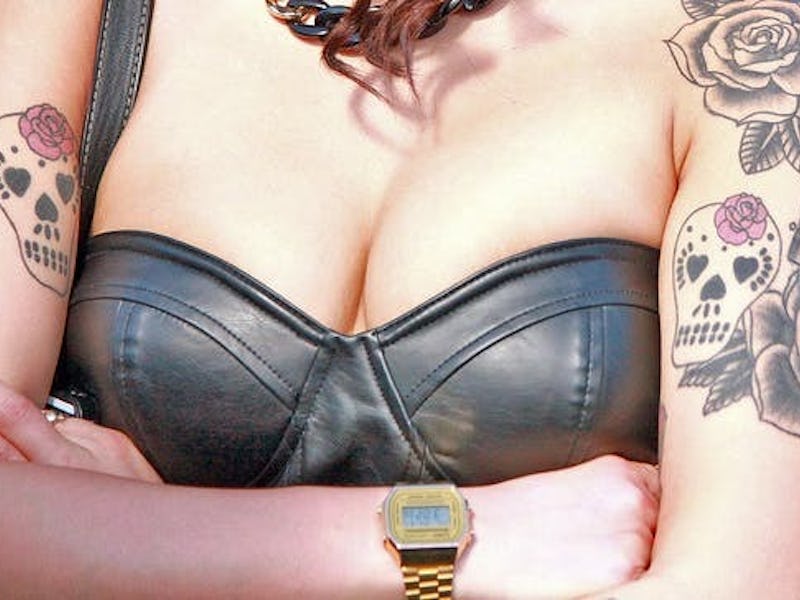Doctor Discovers Unexpected Role of Fake Breasts in Gun Defense
Plastic surgeons shot bullets at breast implants to find out.

In a recent attempt to wrestle a handgun from the hands of a suicidal person, a 34-year-old woman was accidentally shot in the chest by a single bullet. When she was taken to the University of Utah Emergency Room for her trauma, her chest CT scan showed evidence of a miracle: There was no penetrating injury to her thoracic cavity and no rib fractures, despite the fact that she was less than two feet away from the handgun.
Later, a plastic surgery team determined that the bullet passed through her breast tissue and then hit something unexpected: her saline breast implant.
Did her breast implants save her life? Or, more specifically, was it possible that the implant affected the bullet trajectory or velocity in some way? That’s the question that came up for Dr. Christopher Pannucci, the University of Utah plastic and reconstructive surgeon who worked on this case, and the inspiration behind his recent paper published in the Journal of Forensic Sciences.
“I think that all intriguing clinical questions come from patient interactions, and she certainly was that for me,” Pannucci tells Inverse. “The idea that a breast implant could save someone from, say, a car accident or a stabbing has certainly come up in popular media before. I hadn’t personally taken care of a patient with that experience before, and when this patient came in it really got me thinking about it.”
Breast implants saved this woman's life, but we shouldn't count on them for self-defense.
Spoiler alert: Pannucci did not find that breast implants can stop bullets. A breast implant may decrease the energy (speed) of a bullet, but that doesn’t mean that it will slow the bullet enough that it won’t penetrate a person’s chest or abdomen. Still, there’s a statistically significant difference (about 20 percent) in the bullet’s penetration distance when a saline implant is or is not present.
To determine this, Pannucci and a research team consisting of experts in plastic surgery, medical physics, firearms, ballistics, and forensic engineering, used a block of ballistics gel to reproduce the density of human tissue. Ten blocks of ballistic gel were outfitted with a saline breast implant, while 11 were not. Then, on a cold day at an outdoor firearm range in December 2016, the team fired bullets at the gel blocks and implants from 8 feet away.
When they examined the 21 samples, they found that a bullet that passes through a 7.4 centimeter-thick saline breast implant does slow down, but it also “mushrooms” earlier. Mushrooming is a term describing the way hollow-point bullets open on impact in order to increase the surface area of injury; so, by mushrooming earlier, the bullet that passes through a breast implant has an increased path size and is actually more injurious.
Ultimately, the penetration of the bullet into the ballistics gel after hitting a breast implant was 32 centimeters, which means that, no, a breast implant can’t be counted on to stop a bullet. “That means that the expectation is that even after it goes through an implant, the bullet will continue to penetrate,” says Pannucci. “Implants are probably not life-saving from gunshot wounds.”
These tests were carried out online on saline implants, which are filled with sterile water. Pannucci’s team didn’t perform the experiment on silicone implants, which have been more commonly used for augmentation and reconstruction. Because silicone implants are more viscous than saline, he speculates that they could possibly slow the velocity more than saline — but he can’t say for sure until that’s tested.
The experimental design
Pannucci hopes that his study serves as a cautionary tale for people who want to believe that breast implants are basically Kevlar vests. With headlines like “Woman’s Breast Implant Saves Her Life After She Is ‘Viciously Stabbed by Love Rival’” and “Woman’s Size-D Breast Implants Save Her From Gunshot”, the media certainly doesn’t help. But those instances are lucky results, and not the norm. According to the American Society of Plastic Surgeons, there are millions of women in the United States with breast implants. The idea that some of them might encounter gun violence and manage to deflect it isn’t improbable. But the results of this study demonstrate that implants are still mostly life-improving rather than life-saving.
“If you come across information that says breast implants or books might stop bullets,” says Pannucci, referring to the woman who accidentally shot and killed her boyfriend in a YouTube experiment involving books, “that’s probably incorrect.”